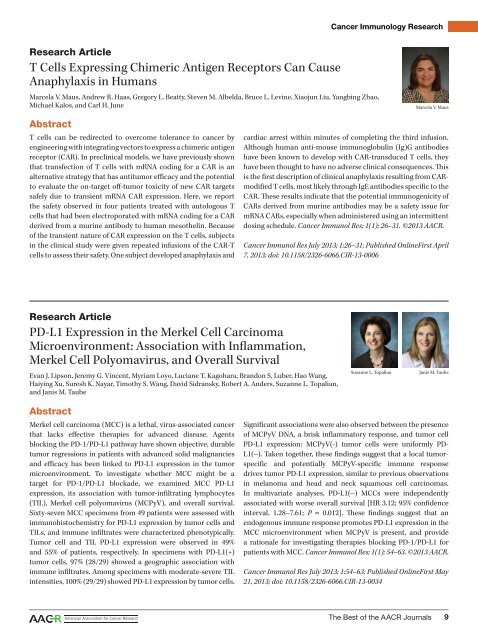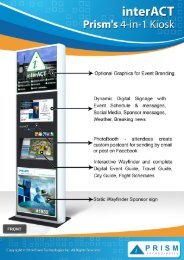Best of AACR Journals
Create successful ePaper yourself
Turn your PDF publications into a flip-book with our unique Google optimized e-Paper software.
Cancer Immunology Research<br />
Research Article<br />
T Cells Expressing Chimeric Antigen Receptors Can Cause<br />
Anaphylaxis in Humans<br />
Marcela V. Maus, Andrew R. Haas, Gregory L. Beatty, Steven M. Albelda, Bruce L. Levine, Xiaojun Liu, Yangbing Zhao,<br />
Michael Kalos, and Carl H. June<br />
Marcela V. Maus<br />
Abstract<br />
T cells can be redirected to overcome tolerance to cancer by<br />
engineering with integrating vectors to express a chimeric antigen<br />
receptor (CAR). In preclinical models, we have previously shown<br />
that transfection <strong>of</strong> T cells with mRNA coding for a CAR is an<br />
alternative strategy that has antitumor efficacy and the potential<br />
to evaluate the on-target <strong>of</strong>f-tumor toxicity <strong>of</strong> new CAR targets<br />
safely due to transient mRNA CAR expression. Here, we report<br />
the safety observed in four patients treated with autologous T<br />
cells that had been electroporated with mRNA coding for a CAR<br />
derived from a murine antibody to human mesothelin. Because<br />
<strong>of</strong> the transient nature <strong>of</strong> CAR expression on the T cells, subjects<br />
in the clinical study were given repeated infusions <strong>of</strong> the CAR-T<br />
cells to assess their safety. One subject developed anaphylaxis and<br />
cardiac arrest within minutes <strong>of</strong> completing the third infusion.<br />
Although human anti-mouse immunoglobulin (Ig)G antibodies<br />
have been known to develop with CAR-transduced T cells, they<br />
have been thought to have no adverse clinical consequences. This<br />
is the first description <strong>of</strong> clinical anaphylaxis resulting from CARmodified<br />
T cells, most likely through IgE antibodies specific to the<br />
CAR. These results indicate that the potential immunogenicity <strong>of</strong><br />
CARs derived from murine antibodies may be a safety issue for<br />
mRNA CARs, especially when administered using an intermittent<br />
dosing schedule. Cancer Immunol Res; 1(1); 26–31. ©2013 <strong>AACR</strong>.<br />
Cancer Immunol Res July 2013; 1:26–31; Published OnlineFirst April<br />
7, 2013; doi: 10.1158/2326-6066.CIR-13-0006<br />
Research Article<br />
PD-L1 Expression in the Merkel Cell Carcinoma<br />
Microenvironment: Association with Inflammation,<br />
Merkel Cell Polyomavirus, and Overall Survival<br />
Evan J. Lipson, Jeremy G. Vincent, Myriam Loyo, Luciane T. Kagohara, Brandon S. Luber, Hao Wang,<br />
Haiying Xu, Suresh K. Nayar, Timothy S. Wang, David Sidransky, Robert A. Anders, Suzanne L. Topalian,<br />
and Janis M. Taube<br />
Suzanne L. Topalian<br />
Janis M. Taube<br />
Abstract<br />
Merkel cell carcinoma (MCC) is a lethal, virus-associated cancer<br />
that lacks effective therapies for advanced disease. Agents<br />
blocking the PD-1/PD-L1 pathway have shown objective, durable<br />
tumor regressions in patients with advanced solid malignancies<br />
and efficacy has been linked to PD-L1 expression in the tumor<br />
microenvironment. To investigate whether MCC might be a<br />
target for PD-1/PD-L1 blockade, we examined MCC PD-L1<br />
expression, its association with tumor-infiltrating lymphocytes<br />
(TIL), Merkel cell polyomavirus (MCPyV), and overall survival.<br />
Sixty-seven MCC specimens from 49 patients were assessed with<br />
immunohistochemistry for PD-L1 expression by tumor cells and<br />
TILs, and immune infiltrates were characterized phenotypically.<br />
Tumor cell and TIL PD-L1 expression were observed in 49%<br />
and 55% <strong>of</strong> patients, respectively. In specimens with PD-L1(+)<br />
tumor cells, 97% (28/29) showed a geographic association with<br />
immune infiltrates. Among specimens with moderate-severe TIL<br />
intensities, 100% (29/29) showed PD-L1 expression by tumor cells.<br />
Significant associations were also observed between the presence<br />
<strong>of</strong> MCPyV DNA, a brisk inflammatory response, and tumor cell<br />
PD-L1 expression: MCPyV(-) tumor cells were uniformly PD-<br />
L1(-). Taken together, these findings suggest that a local tumorspecific<br />
and potentially MCPyV-specific immune response<br />
drives tumor PD-L1 expression, similar to previous observations<br />
in melanoma and head and neck squamous cell carcinomas.<br />
In multivariate analyses, PD-L1(-) MCCs were independently<br />
associated with worse overall survival [HR 3.12; 95% confidence<br />
interval, 1.28–7.61; P = 0.012]. These findings suggest that an<br />
endogenous immune response promotes PD-L1 expression in the<br />
MCC microenvironment when MCPyV is present, and provide<br />
a rationale for investigating therapies blocking PD-1/PD-L1 for<br />
patients with MCC. Cancer Immunol Res; 1(1); 54–63. ©2013 <strong>AACR</strong>.<br />
Cancer Immunol Res July 2013; 1:54–63; Published OnlineFirst May<br />
21, 2013; doi: 10.1158/2326-6066.CIR-13-0034<br />
The <strong>Best</strong> <strong>of</strong> the <strong>AACR</strong> <strong>Journals</strong> 9



